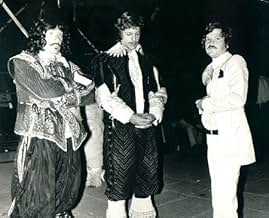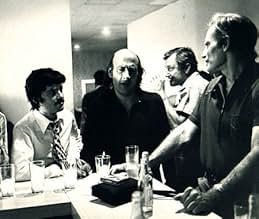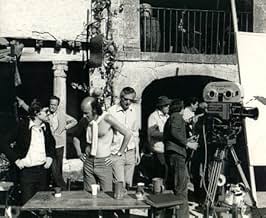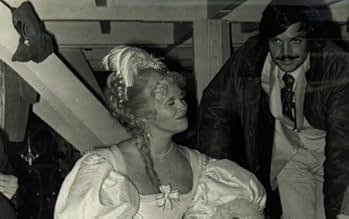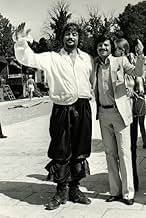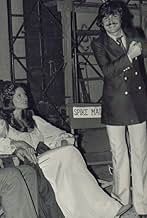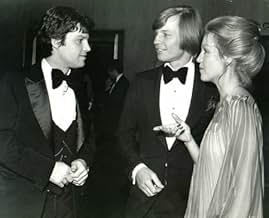IMDb RATING
7.1/10
21K
YOUR RATING
A young swordsman comes to Paris and faces villains, romance, adventure and intrigue with three Musketeer friends.A young swordsman comes to Paris and faces villains, romance, adventure and intrigue with three Musketeer friends.A young swordsman comes to Paris and faces villains, romance, adventure and intrigue with three Musketeer friends.
- Director
- Writers
- Stars
- Nominated for 5 BAFTA Awards
- 4 wins & 7 nominations total
Jean-Pierre Cassel
- King Louis XIII
- (as Jean Pierre Cassel)
- Director
- Writers
- All cast & crew
- Production, box office & more at IMDbPro
Featured reviews
This film (and its companion piece The Four Musketeers) is the finest adaptation of the Dumas classic. It perfectly captures the blend of romance, adventure, and comedy inherent in the novel. There is some modification for modern viewers, but the spirit and attitude of the era is preserved.
Michael York gives one of his best performances as the young, naive D'Artagnan. He appears to be a bit of a bumbling idiot at first; but, one soon learns that a keen brain lies behind that bumbling exterior. This portrayal was criticized by another filmmaker, who adapted another of Dumas' tales. Judging by how far that director strayed from Dumas, it's understandable how he missed noting that Dumas portrayed D'Artagnan in the same manner at the beginning of the novel. D'Artagnan grows with his experiences and becomes a leader of men by the end of the novel; one who has confounded Cardinal Richelieu at every turn and preserved the honor of his Queen and country.
Oliver Reed was perfectly cast as Athos, the melancholy drunkard. Athos is a man who has endured great pain and betrayal in his life and finds his only pleasure in drinking and brawling. He is the wise counsel to the young D'Artagnan, and the mysterious side to the Musketeer triangle.
Frank Finlay, a wonderful character actor, brings a wonderful, arrogant bluster to Porthos; a gentleman, a braggart, and a fool. Finlay also has a nice turn as the jeweler O'Reilly, showcasing his versatility.
Richard Chamberlain is Aramis, the future priest and great lover. Aramis gives an air of spiritual devotion, while romancing his mistresses. Like many clergy of the upper classes, he sees no conflict in these attitudes, or his profession as a soldier. Chamberlain brings great subtlety to Aramis. His part is not as big as the other two, but he says much with body language and attitude. He more than holds his own with the stage-trained Brits.
Charlton Heston brings a deep menace to Richelieu, quite the opposite of his previous heroes. He shows the devious nature of the Cardinal, and the intelligence of a man who knows he has lost, but will have other battles down the line.
Faye Dunaway is the beautiful and vicious Milady. She is the deadliest of D'Artagnan's adversaries; she charms with her beauty and grace, as she prepares her dagger unseen.
Christopher Lee is D'Artagnan's rival, Rochefort. Lee is always good, even when the film isn't. Luckily, this film is up to his abilities. His cool demeanor is backed by a strong sword arm.
The cast is rounded out by fine character performances from Roy Kinnear as Planchet, Jean-Pierre Cassel as King Louis XIII, Geraldine Chaplain as Anne of Austria, and Spike Milligan as M. Bonacieux. Raquel Welch gives a surprisingly deft turn in the comic role of Constance.
There is plenty of action, romance, drama, and fun for fans of each. The sum of those parts results in a classic that outshines all other attempts at Dumas. It is a swashbuckler to rival any Errol Flynn movie, a romance equal to a Merchant-Ivory production, and a comedy to rival Monty Python.
Forget Gene Kelly, the Ritz Brothers, and Charlie Sheen and company. These are the true Musketeers.
Michael York gives one of his best performances as the young, naive D'Artagnan. He appears to be a bit of a bumbling idiot at first; but, one soon learns that a keen brain lies behind that bumbling exterior. This portrayal was criticized by another filmmaker, who adapted another of Dumas' tales. Judging by how far that director strayed from Dumas, it's understandable how he missed noting that Dumas portrayed D'Artagnan in the same manner at the beginning of the novel. D'Artagnan grows with his experiences and becomes a leader of men by the end of the novel; one who has confounded Cardinal Richelieu at every turn and preserved the honor of his Queen and country.
Oliver Reed was perfectly cast as Athos, the melancholy drunkard. Athos is a man who has endured great pain and betrayal in his life and finds his only pleasure in drinking and brawling. He is the wise counsel to the young D'Artagnan, and the mysterious side to the Musketeer triangle.
Frank Finlay, a wonderful character actor, brings a wonderful, arrogant bluster to Porthos; a gentleman, a braggart, and a fool. Finlay also has a nice turn as the jeweler O'Reilly, showcasing his versatility.
Richard Chamberlain is Aramis, the future priest and great lover. Aramis gives an air of spiritual devotion, while romancing his mistresses. Like many clergy of the upper classes, he sees no conflict in these attitudes, or his profession as a soldier. Chamberlain brings great subtlety to Aramis. His part is not as big as the other two, but he says much with body language and attitude. He more than holds his own with the stage-trained Brits.
Charlton Heston brings a deep menace to Richelieu, quite the opposite of his previous heroes. He shows the devious nature of the Cardinal, and the intelligence of a man who knows he has lost, but will have other battles down the line.
Faye Dunaway is the beautiful and vicious Milady. She is the deadliest of D'Artagnan's adversaries; she charms with her beauty and grace, as she prepares her dagger unseen.
Christopher Lee is D'Artagnan's rival, Rochefort. Lee is always good, even when the film isn't. Luckily, this film is up to his abilities. His cool demeanor is backed by a strong sword arm.
The cast is rounded out by fine character performances from Roy Kinnear as Planchet, Jean-Pierre Cassel as King Louis XIII, Geraldine Chaplain as Anne of Austria, and Spike Milligan as M. Bonacieux. Raquel Welch gives a surprisingly deft turn in the comic role of Constance.
There is plenty of action, romance, drama, and fun for fans of each. The sum of those parts results in a classic that outshines all other attempts at Dumas. It is a swashbuckler to rival any Errol Flynn movie, a romance equal to a Merchant-Ivory production, and a comedy to rival Monty Python.
Forget Gene Kelly, the Ritz Brothers, and Charlie Sheen and company. These are the true Musketeers.
Richard Lester has to be one of the greatest directors of comedy there ever was. There are dozens of slapstick gags and situations in this movie and almost 100% of them work. And what an opulent setting they are placed in! Lester and his cohorts have created a film in which almost every frame resembles a museum painting come to life (and gone berserk.)
Lester is better with style than relating a narrative. I found it impossible to completely comprehend the story line here, and I think if you asked most people what the movie was about, they'd tell you there was a lot of swashbuckling and general mayhem and lunacy, but I doubt they'd give you much of Dumas' story. When the style is this good, however, a little fuzziness on the substance is not a fatal flaw. Still, it might keep this picture from being an all-time classic rather than "just" a most enjoyable film.
Lester is such an auteur that his direction is the main focus of this film even with such an all-star cast. It was a wise decision (actually it seems like a no-brainer) to divide what was originally shot at one time into two films, this one and 'The Four Musketeers.' There really can be too much of a good thing, and even at under two hours, 'The Three Musketeers' threatens to be overwhelming. But on balance this film is great entertainment.
Lester is better with style than relating a narrative. I found it impossible to completely comprehend the story line here, and I think if you asked most people what the movie was about, they'd tell you there was a lot of swashbuckling and general mayhem and lunacy, but I doubt they'd give you much of Dumas' story. When the style is this good, however, a little fuzziness on the substance is not a fatal flaw. Still, it might keep this picture from being an all-time classic rather than "just" a most enjoyable film.
Lester is such an auteur that his direction is the main focus of this film even with such an all-star cast. It was a wise decision (actually it seems like a no-brainer) to divide what was originally shot at one time into two films, this one and 'The Four Musketeers.' There really can be too much of a good thing, and even at under two hours, 'The Three Musketeers' threatens to be overwhelming. But on balance this film is great entertainment.
Let me begin by expressing how refreshing it feels to watch a series of action scenes without wretched shaky cam! After seeing Guardians of the Galaxy and the new Ninja Turtles movies at the cinema recently, I had almost forgotten what it was like to have a comprehensible fight sequence.
This 1973 version of The Three Musketeers is the best version of the story I have ever seen, even better than the over-praised Gene Kelly adaptation. It's athletic, earthy, and light-hearted, paired with one of the most perfect casts ever brought together for a movie and Michel Legrand's amazing score which proves adventurous and heart-achingly romantic in equal turns.
If you love action and comedy, then I cannot recommend this enough. I never wanted it to end and cannot wait to watch the sequel.
This 1973 version of The Three Musketeers is the best version of the story I have ever seen, even better than the over-praised Gene Kelly adaptation. It's athletic, earthy, and light-hearted, paired with one of the most perfect casts ever brought together for a movie and Michel Legrand's amazing score which proves adventurous and heart-achingly romantic in equal turns.
If you love action and comedy, then I cannot recommend this enough. I never wanted it to end and cannot wait to watch the sequel.
Richard Lester did what no one before or since has been able to do: tell Dumas' story as magnificently as it deserves to be told. This tale gets told again and again in Hollywood, but leave it to a European to do it right. The cinematography, sets, and costumes are all fantastic, but they aren't all clean and impossibly perfect like the 1948 Gene Kelly or 1993 Kiefer Sutherland versions. Lester infuses this familiar story with an energy and tone that made his work with the Beatles successful. Yes, "The Three Musketeers" is an intriguing adventure, but the humor in their friendship, that's what draws me in again and again. And what an amazing cast he had to work with: all the Musketeers are perfect, especially big Oliver Reed, who can be silly, witty, and scary all in the same scene. The supporting cast is full of great actors, including Charlton Heston (having fun at being evil here), Christopher Lee (gets to mix deadpan humor in with his menace), Raquel Welch (cast as beautiful but clumsy, really enabling her to be a character and not just a live mannequin), Spike Milligan (doing what he does best), and most wonderfully Faye Dunaway (seductively evil: my favorite kind!). And, of course, holding it all together as D'Artagnan is Michael York, who never found a greater role.
Besides handling the shifts in tone well, Richard Lester also had the great rare luxury of breaking Dumas' large novel into two seperate movies which he filmed simultaneously. This really allows for greater character development and a truly epic scale. All of the other film versions try to cram all of that plot into 120 minutes. Not only is it impossible (in the 1993 version they simply change it completely using only the basic idea of Dumas' book), but it makes this huge complicated story with many threads seem contrived and ridiculous (the 1948 version has such dramatic and sudden shifts of tone - from wacky comedy, to romance, to heavy drama - that it can confuse and lose the audience).
This is great moviemaking.
Besides handling the shifts in tone well, Richard Lester also had the great rare luxury of breaking Dumas' large novel into two seperate movies which he filmed simultaneously. This really allows for greater character development and a truly epic scale. All of the other film versions try to cram all of that plot into 120 minutes. Not only is it impossible (in the 1993 version they simply change it completely using only the basic idea of Dumas' book), but it makes this huge complicated story with many threads seem contrived and ridiculous (the 1948 version has such dramatic and sudden shifts of tone - from wacky comedy, to romance, to heavy drama - that it can confuse and lose the audience).
This is great moviemaking.
I have loved this film (or rather, these films!) since I first saw them as a child in the early eighties. At that point I hadn't read the novels, but, unusually, I think no less of the films now that I have. In their broad, slapstick style of humour, they perhaps reflect the times in which they were made, rather than Dumas, but there is no lack of the original's tragedy in the scenes of Athos' past and D'Artagnan's disillusion. George Macdonald Fraser's script is as fine as you'd expect of the writer of the 'Flashman' novels and the choreography of the fight scenes has been justly praised. The foils were apparently as heavy as their Seventeenth Century counterparts and the actors' agony was increased by filming in the hot Spanish sun....
When I watched these films again a few weeks ago I was also struck by the beautiful cinematography, with the scene in the snow and the climactic fight in the convent particularly well-framed. For me, this is as near-perfect an adaptation of the adventure novel as is possible, combining romance, humour, tragedy and action with wonderful production values and a terrific script. Few other films, and no other version of the 'Musketeers', reaches this standard. Messieurs York, Reed, Finlay, Chamberlain, Heston, Ward, Lee, Milligan and Kinnear, plus Mmes Dunaway, Chaplain and Welch will forever be associated with their characters for me. Brilliant stuff!
When I watched these films again a few weeks ago I was also struck by the beautiful cinematography, with the scene in the snow and the climactic fight in the convent particularly well-framed. For me, this is as near-perfect an adaptation of the adventure novel as is possible, combining romance, humour, tragedy and action with wonderful production values and a terrific script. Few other films, and no other version of the 'Musketeers', reaches this standard. Messieurs York, Reed, Finlay, Chamberlain, Heston, Ward, Lee, Milligan and Kinnear, plus Mmes Dunaway, Chaplain and Welch will forever be associated with their characters for me. Brilliant stuff!
Did you know
- TriviaOliver Reed was severely injured and almost died when he was stabbed in the throat during the windmill duel scene.
- GoofsRichelieu refers to Buckingham as the Prime Minister of England. However, the title was not adopted until the early 1700s, and even then was an unofficial name for the First Lord of the Treasury. It was not until 1937 that it was enshrined in law as the title of the Head of Government. Although Buckingham was undoubtedly one of the most powerful members of the English Court, he had no formal position as such, as there was no equivalent of a Prime Minister: the King himself was regarded as the Head of Government as well as Head of State.
- Quotes
Cardinal Richelieu: Who is the man that accuses you?
Bonacieux: [Rochefort enters and Bonacieux points at him] That! That is the man!
Count Rochefort: Take him away.
Bonacieux: That is *not* the man!
- ConnectionsEdited into On l'appelait Milady (1974)
Details
- Release date
- Countries of origin
- Official site
- Language
- Also known as
- Les ferrets de la reine
- Filming locations
- Summer Palace, Aranjuez, Madrid, Spain(The Louvre)
- Production companies
- See more company credits at IMDbPro
Box office
- Budget
- $4,500,000 (estimated)
Contribute to this page
Suggest an edit or add missing content



